It’s been twelve years(!) since my first healthcare keynote speech, September 2009, at Gunther Eysenbach’s “Medicine 2.0” conference in Toronto, which was the genesis of the battle cry “Gimme my damn data!” Reflecting on how that all started – it was just a series of blog posts expressing curiosity about how to improve healthcare – I decided to publish them at no charge as a compilation e-book, for convenient reference. The book’s page is here.
[Read more…]Search Results for: origin-story
“Birth of a battle cry”: reader comments
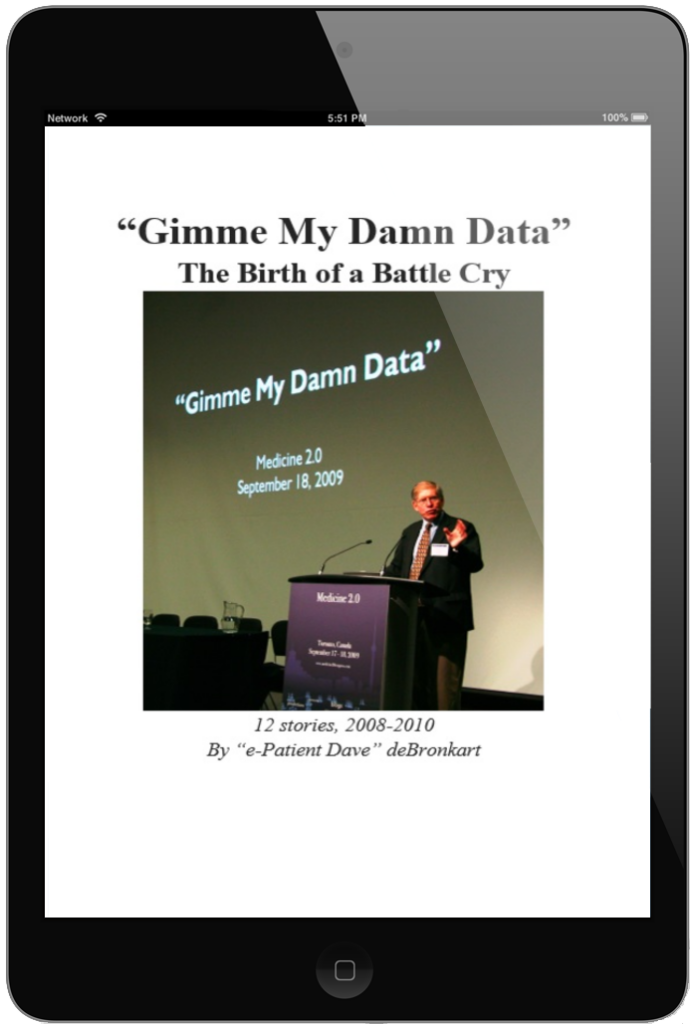
This page contains comments about this book’s story, from people who were involved in this advocacy before the story started, during its unfolding, and have continued the work.
In April of 2009 I flew to Boston for a Health 2.0 conference. From the mainstage, co-host Matthew Holt unexpectedly called on a member of the audience. On a side balcony on the second floor, a tall man stood up. All heads turned to see a patient named Dave. With a clear and loud voice, gesticulating for effect, he recounted his experience with Google Health.
At the time, I was an independent consultant in Washington DC, a hired gun for organizations crazy enough to believe at the time, as I did, that digital health information might actually be beneficial for patients. “Wow,” I thought. “That’s a voice Washington DC needs to hear.”
I knew plenty of patient advocates back in DC. Most focused on privacy and security, even at the cost of locking up health information. But Dave wanted access to his data. He wanted to use it to improve his own health, and to collaborate with his doctors. Yes, that!
A few months later, Dave attended a meeting at the Center for Democracy and Technology that I’d helped Deven McGraw to organize. It was the start of a long and fruitful friendship. In 2012 when I faced some strong resistance in my role building the Office of Consumer eHealth at ONC, Dave was an invaluable collaborator and sounding board for me. And through our friendship he became a literal poster boy for the empowered patient of the future. Dave continues to be a first-rate patient, changemaker, visionary, and friend.
— Lygeia Ricciardi, consumer evangelist, policymaker, and entrepreneur at Ada Rose
The first time I met Dave was when he came to Washington, D.C., at the invitation of the Health Privacy Project at the Center for Democracy & Technology, and he told his story about accessing his health information and how that helped him find the treatment that saved his life. I had always been a proponent of the right of patients to get their health data – but I didn’t fully appreciate the potential power of that data, in the hands of a patient, until I heard Dave’s story. Soon after that, he named his movement – “Gimme My Damn Data” – and getting patients access to their data became a major federal policy priority.
We still have a long way to go before patient access to data is the norm – but I can’t imagine how far behind we would be without Dave’s early advocacy work.
— Deven McGraw, Ciitizen Corp. Health privacy expert, health data evangelist; at the time, head of the Health Privacy Project at the Center for Democracy & Technology
I first met e-Patient Dave at the Medicine 2.0 conference in 2009 in Toronto. I was familiar with vocal patient advocates from my days as an oncology social worker in the 1980s and 90s but they were mostly advocating for better treatments. What Dave was doing was new to me – advocating for access to his health data now available through early patient portals tethered to EMRs.
It made perfect sense to me – provide patients their data so they could participate more fully in their medical decisions.
Also, in that speech, Dave was advocating for correcting errors in the EMR data which had been featured in an article about him in the Boston Globe. Since then, Dave has helped to activate a whole generation of patients advocating for access to data and full participation in medical decisions, a major shift from the traditional, paternalistic approach to medical decision making.
— John Sharp, Connected Health Alliance; at the time, Cleveland Clinic
In my innovation journey over the past 20 years there were some pivotal moments, some of them led to a epiphany. Dave’s talk in Canada “Gimme my damn data” clearly showed me the path forward in changing healthcare into a sustainable, accessible and even more effective system.
The video of his TED talk is being used in medical and nursing schools to teach and in general could be seen as core of what needs to be done, still in 2021: letting patients help improve care, which they cannot do without access to their own health information.
— Lucien Engelen, Deloitte Center for the Edge; creator of #PatientsIncluded and the TEDx where I spoke
E-book: “The Birth of a Battle Cry:
Gimme My Damn Data”
Download free from these e-book stores.
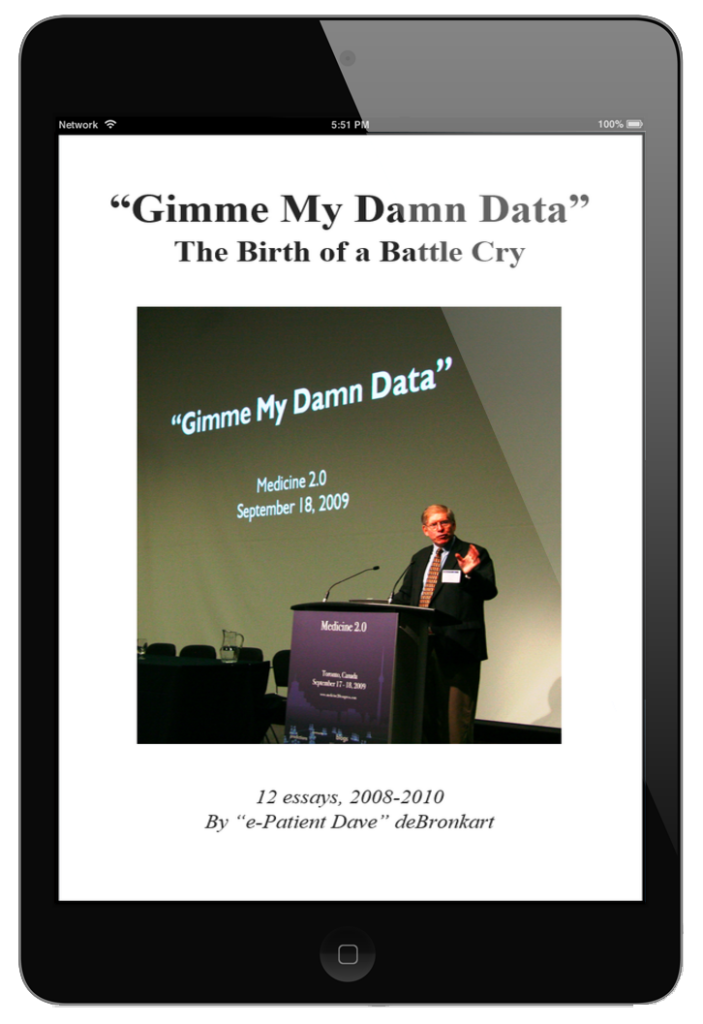
This book is a compilation of 12 essays (blog posts) that unfolded over two years, starting my odyssey as an advocate for patient access to their medical records.
The original articles are all available online for free, but it’s compiled here for convenience, and I hope it will be of use to future students of health IT policy, because it tells how one patient trying to improve healthcare stumbled on a subject that others had struggled with.
Patients – including you – have a fundamental right to know what’s in their medical record, but for all of recorded history, archaic attitudes have too often kept your data out of your hands. For decades hundreds of people have worked to give us access, and in 2021 the US Cures Act Final Rule has finally made it Federal policy that your data will be available via API (software interface), so you can pull it into health apps of your choosing, or share it with other doctors (or anyone you want!) or do anything you want with it. Because it’s yours.
Why publish this compilation?
Lately a wave of health IT newcomers have been asking how I got into it, especially my 2009 demand “Just gimme my damn data!” that unwittingly became a rallying cry that spread virally and even became a rock video by the great Ross Martin MD and his garage band “Sons of Artemis.”
Importantly, the book shows that the motivation for my journey was for patients to be able to take responsibility for their health and (when necessary) their care. And that in turn was motivated by the realization that the US health system, while it’s full of brilliant people, as a system is a gigantic Gordian knot of financial incentives that keep it fixated on its own interests, not yours, not mine, nor your doctors’ and nurses’ interests. The system itself – not the workers in it – is a problem that impedes good care.
A full decade later those forces have played out with predictable results: the industry is far more expensive than it was then, patient satisfaction has not improved, nor have patient outcomes.
The remedy, I continue to believe, is to build a new ecosystem of health tools enabled by access to our data. I hope this book will convey the roots of this motivation, how vehemently parts of the system have objected, and the value and importance of patients’ access to their medical information.
For context, I’ve added a page of comments from people wiser than me who were involved in the work before this story, during the story, and have continued the work.
Books and publications
Part of creating culture change is to publish documents, professional and mass-market, that spread the word about the new view. In addition to my speeches and videos, I do this through articles and books.
Books
For more information, visit the Books page.
- The Birth of a Battle Cry: Gimme My Damn Data
This book is a compilation of 12 essays (blog posts) that unfolded over two years, starting my odyssey as an advocate for patient access to their medical records. -
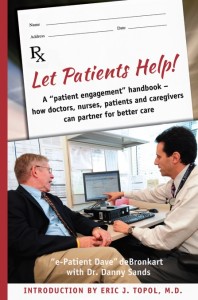
Let Patients Help: A Patient Engagement Handbook with Dr. Danny Sands; introduction by Eric Topol MD; now in nine languages
- Laugh, Sing, and Eat Like a Pig: How an empowered patient beat Stage IV kidney cancer – my cancer diary on CaringBridge (excerpts), with later blog posts
- Facing Death – With Hope. An excerpt from Laugh, Sing, and Eat Like a Pig, which the Mayo Clinic Healing Words program asked me to read from when I was Visiting Professor in 2015. Video here.
Book chapters written and co-authored
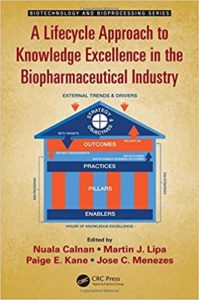 Book chapter: “Who Moved My Facts? Patient autonomy and the evolution of infrastructure mean best available knowledge is not where it used to be.” Chapter in A Lifecycle Approach to Knowledge Excellence in Biopharmaceutical Industry, edited by Nuala Calnan, Martin J. Lipa, Paige E. Kane, Jose C. Menezes. June 2017
Book chapter: “Who Moved My Facts? Patient autonomy and the evolution of infrastructure mean best available knowledge is not where it used to be.” Chapter in A Lifecycle Approach to Knowledge Excellence in Biopharmaceutical Industry, edited by Nuala Calnan, Martin J. Lipa, Paige E. Kane, Jose C. Menezes. June 2017- Foreword: “The Unfolding Science of Patient Engagement,” in The State of Healthcare – From Challenges to Opportunities published by DNV GL and Sustainia. April 2015.
- Booklet (co-author): Reinventing Health Care: Barriers to Innovation. Aspen Institute, 2012.
Articles in peer reviewed journals
Search my publications and citations on Google Scholar or PubMed
- Gimme My Damn Data (and Let Patients Help!): The #GimmeMyDamnData Manifesto. JMIR; Vol. 21, No 11 (2019) November
- Prehabilitation can be tricky or empowering. BMJ 2019; 367
- Open access: remember the patients. BMJ 2019; 365 doi: https://doi.org/10.1136/bmj.l1545
- Developing and Testing a Personalized, Evidence-Based, Shared Decision-Making Tool for Stent Selection in Percutaneous Coronary Intervention Using a Pre-Post Study Design. Feb. 2019. AHA Journals Circulation: Cardiovascular Quality and Outcomes. Adnan K. Chhatriwalla, MD; Carole Decker, RN, PhD; Elizabeth Gialde, RN, MSN; Delwyn Catley, PhD; Kathy Goggin, PhD; Katie Jaschke, MSN, RN, AGACNP-BC; Philip Jones, MS; Dave deBronkart, SB; Tony Sun, MBA, FACP; John A. Spertus, MD, MPH
- Assessment of US Hospital Compliance With Regulations for Patients’ Requests for Medical Records. October 2018. JAMA Network Open. Carolyn T. Lye, BA; Howard P. Forman, MD, MBA; Ruiyi Gao, BS; Jodi G. Daniel, JD, MPH; Allen L. Hsiao, MD; Marilyn K. Mann, JD; Dave deBronkart, BS; Hugo O. Campos; Harlan M. Krumholtz, MD, SM
- The patient’s voice in the emerging era of participatory medicine. August 2018. Lead article in annual special issue of International Journal of Psychiatry in Medicine. https://doi.org/10.1177/0091217418791461
- Digital health is a culture transformation of traditional healthcare. Sept. 2018. Meskó B, Drobni Z, Bényei É, Gergely B, Győrffy Z. mHealth 2017;3:38. (Acknowledged contributor)
- Beyond restenosis: Patients’ preference for drug eluting or bare metal stents. Catheter & Cardiovascular Interventions. Qintar M, Chhatriwalla AK, Arnold SV, Tang F, Buchanan DM, Shafiq A, Pokharel Y, deBronkart D, Ashraf JM, Spertus JA.
- “I want to know everything”: a qualitative study of perspectives from patients with chronic diseases on sharing health information during hospitalization. BMC Health Services Research: (2017) 17:529
- The paradigm of patient must evolve: Why a false sense of limited capacity can subvert all attempts at patient involvement. Patient Experience Journal: Vol. 4 : Iss. 2 , Article 2.
- Patient commentary: Empowered patients aren’t belittled by doctors’ titles. Nov. 2015. BMJ 2015;351:h635511/25/2015
- Open Visit Notes: A Patient’s Perspective and Expanding National Experience, with Jan Walker, RN, MBA. Journal of Oncology Practice. May 2015. doi:10.1200/JOP.2015.004366
- From patient centred to people powered: autonomy on the rise. Invited essay, BMJ Patient-Centred Care Spotlight, February 2015.
- How the e-Patient Community Helped Save My Life. Invited essay, British Medical Journal, April 2013. [BMJ 2013;346:f1990]
- Paper: West HJ, deBronkart D, & G Demetri. A New Model: Physician-Patient Collaboration in Online Communities and the Clinical Practice of Oncology. In: Govindan R, ed. 2012 ASCO Educational Book. Alexandria, VA: American Society of Clinical Oncology; 2012;475-479.
Articles in health-related publications and blogs
- 8 Ways AI Can Help You Be Healthier. Men’s Health magazine, Jan-Feb 2025
- Important HIPAA Update: New Penalties – Clinics get $85,000 Fines for NOT Releasing Data to Patients. SolutionReach Blog, 1/8/20
- Can Your Robot Do This?? – Pick Tasks that Can be Solved Today. SolutionReach Blog, 10/8/19
- FHIR on Fire: A New Standard to Make Patient Data More Mobile. SolutionReach 7/9/19
- What Everyone in Healthcare Should Know About Facebook and Data. SolutionReach blog, 4/24/19
- Whose health is it, anyway? Carium blog (on Medium), April 2, 2019
- Consumerism Comes to Healthcare: Listening to Yelp. SolutionReach blog, 1/30/2019
- C’mon, Healthcare – Make it Easier to do the Right Thing! SolutionReach blog, August 2018
- It’s time to flip the script on patient engagement. athena insight, August 2018
- “Keep in touch” – The Hallmark of Good Relationships. SolutionReach blog, June 2018
- Do you blame the receiver if all they hear is noise? EmmiSolutions, October 2017
- Don’t be a passive patient. Future Health Index (Philips), August 2017
- What patients need – and healthcare doesn’t deliver. athena insight, June 2017
- The engaged patient is an anomaly. Let’s fix the paradigm. EngagingPatients.org, April 2017
- The value of sharing data: What healthcare can learn from oncology. Future Health Index, March 2017
- Lessons from Seinfeld: Empower Patients to Look in Their Chart. Health eCareers, December 2016
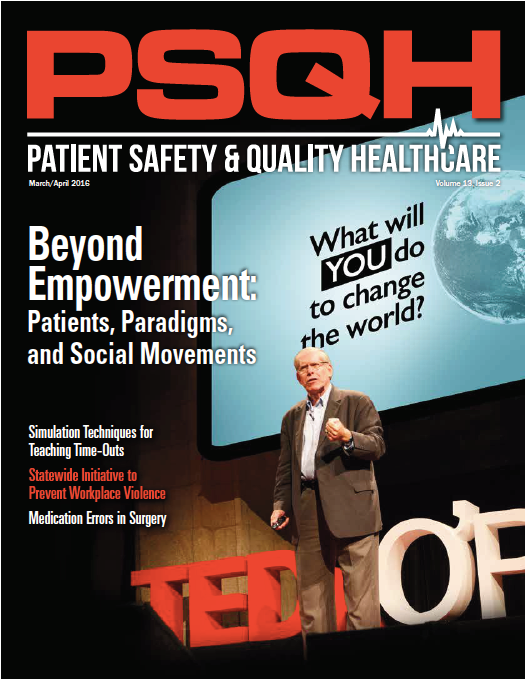 Could data make you live longer? Future Health Index (Philips), August 2016
Could data make you live longer? Future Health Index (Philips), August 2016- Cover story: The Patient’s Perspective: Medicine’s New True North. PLAID Journal (People Living with And Inspired by Diabetes), Spring 2016.
- Cover story: Beyond Empowerment: Patients, Paradigms, and Social Movements. Patient Safety & Quality Healthcare magazine. March/April 2016.
- Knowledge is Power. Power to the People! Guest post for Philips Healthcare, 2/5/2016
- “My Health: Upgraded” is a clear vision from a young futurist. BMJ Blog, 9/16/2015
- “Precision medicine” needs patient partnership, with Dr. Zachary Sholom Berger. BMJ Blog, 3/20/2015
- Essay: Social Media is the Profound Change Fueling the e-Patient World. Mayo Clinic Social Media Health Network, 3/20/2015
- Patient Participation: Let Patients Help With Medical Record Quality, Completeness. Invited guest column, iHealthBeat Perspective, Sept 2013.
- The Multidimensional Role of Social Media in Healthcare. ACM Interactions magazine (Association for Computing Machinery), July-August, 2011. (Co-author)
- Who Gets to Define Quality? Society for Particpatory Medicine, March 14, 2011.
- How Patient-Provider Engagement Can Transform Patient Safety. Patient Safety & Quality Healthcare magazine, November 19, 2010.
See also the Media page for interviews and articles in mainstream media (Washington Post, USA Today, Time, etc) covering my thoughts on contemporary topics.

